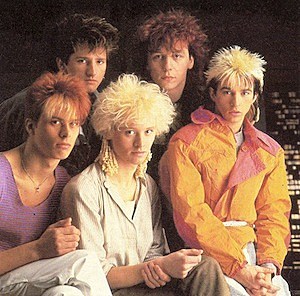We all have skeletons in our closets–well, unless you are under 25 years old and still working on your skeletons. Most adults have done something in their lives for which they are still at least a little embarrassed. And if you are one of the lucky ones, you have no collateral damage as a result of those embarrassing phases. The worse case scenario would be that you made some major decision during those less-than-honorable moments that has haunted you the rest of your life.
Oh, the stories we could tell of each other. Stories that could bring our friends, (and maybe, our enemies) to their knees! It certainly makes the “Friend” feature on Facebook very handy!
I believe that every generation is marked by some negative social stigma. Think of the gangsters of the “Roaring 1920’s.” Chicago was a war-zone. The classic pinstripe suit and the ‘gun in the violin case’ image are synonymous with that decade. The “Swing Kids” of the 1930’s would create a wave of rebellion through dance and lasciviousness. With the big band sound getting old, Hipsters of the 1940’s would begin to explore the uses of cannabis and listen to Jazz. The 1950’s saw the rise of the ‘greasers’ made famous in the movie Grease. Intimidating and regarded as rebels, greasers were associated with rockabilly, jitterbug, and street cars. Beatniks predominately marked the 1960s, along with racial gangs in larger cities and growing motorcycle gangs.  The 1960s also saw major expansion of drug and alcohol use amongst its subcultures as well. While drug use continued to expand and influence the 1970s, the Punk movement was a new identity that took shape in this decade. The 1980s transformed Punks into anarchists and new wave ravers. The 1980s also saw the birth of goth and the Hip Hop Movement. And of course, 2000’s brought about the oft-documented Gen-Xers.
The 1960s also saw major expansion of drug and alcohol use amongst its subcultures as well. While drug use continued to expand and influence the 1970s, the Punk movement was a new identity that took shape in this decade. The 1980s transformed Punks into anarchists and new wave ravers. The 1980s also saw the birth of goth and the Hip Hop Movement. And of course, 2000’s brought about the oft-documented Gen-Xers.
Interestingly, if we consider all of these movements individually, we recall the clothing, music, art, autos, and other ideas, beliefs, and values that made them unique in their ‘coming of age.’ However, in retrospect, we also realize that despite carrying some of that into adulthood, most grown ups from each of these generations abandoned the folly of youth to embrace marriage, parenthood, career expectations, community expectations, and often their place in the community of faith. Most assumed their respective roles in the institutions they once decried.
Despite the embarrassing ideas I believed when I was a young man, and the embarrassing photos that still linger, and the embarrassing things I said to impress, and the embarrassing things I did and drank and took, those are not me. They are not who I am now. I was an idiot, like every other young adult before me, stuck in an identity crisis that had me changing my opinions, my attitude, my religion, and my earrings more often than I changed the sheets on my bed! I want to apologize to the world! And I want to apologize to anyone who got caught in the vortex of my psychosis!
But the greater injustice would be this: if what I said, or did, or believed, or defended, or argued caused one person, or one church, or one school to change a rule or expectation to meet the need that they perceived I had at that age, then may God forgive me! May God forgive us all for defending our stupidity, immaturity, and ignorance that is endemic to youth. I remember a group of young girls in college who wore scanty clothing similar to what Madonna wore in the 1980’s. When they were confronted by school personnel as being inappropriately dressed, they defended their look as “this is me! This is who I am!” So, in time, the school changed its policy, loosening standards of dress in response to the popular culture. But that is not who they really were. It was only a blip in time–a temporary identity crisis that would be abandoned in time.
How many of our schools, churches, social organizations, and government lawmakers make drastic changes to how they approach a generation, or provide rights and privileges for something that we are not. There will always be the counter-culture of any society, challenging the status-quot, or traditional institutions of that culture. They will always defend their actions and point out the superiority of their choices, while demeaning long-held beliefs. But in time, the vast majority will take their rightful place in society–responsibly, maturely, rationally. Be it drug abuse, cutting, goth, tattoos, piercings, or more recently, homosexuality, everyone grows up embarrassed at what we were–embarrassed for taking an adamant stand for something we were not. May we as a nation, and in our social institutions discover and hold true to what we really are, and not capitulate to transient trends and liberal fads, evolving into something irreversibly horrible, something we’re not.



